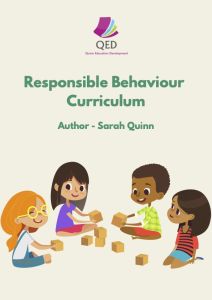For a number of years I have seen a number of issues in the primary schools I visit around engagement in learning. School leaders are telling me that behaviour is declining and teachers are struggling to engage the children in learning. Teachers are trying and trying and getting very frustrated with the behaviour in their classroom and sometimes, with the lack of support from parents. Some teachers struggle to know what boundaries and expectations might be appropriate for children at different ages and get frustrated when children cannot follow a complex instruction or follow the rules consistently. Do we need a behaviour curriculum?
The DfE have recognised behaviour as a problem in some schools and some of the most recent Ofsted reports talk about low-level disruption and extreme behaviour with no clear strategy to address these issues.
I have also noticed that teachers and support staff can be less tolerant with children and are more likely to engage with the negative behaviour rather than provide the positive, regulated role model we are looking for. This can further frustrate children and can actually damage their self-esteem. There seems to be a misunderstanding that every child must be treated in the same way never mind their age or stage of development.

So, are we at crisis point? Or is this the ‘new normal’?
Much of the work I do has been in early years and, those of you that know anything about early years know that a big part of the personal and social development of the youngest children includes self-regulation. This area is even identified as an Early Learning Goal and a Key Feature of Effective Learning. But, this is an area that seems to be in decline. Some children are starting school with fewer skills in this area and lack the ability to control emotion or impulses. Now, I know we do not fully have these skills until we are well into our 20s or even 30s but children are not where we might expect them to be when they start school. Language starting points are also in decline in some areas with children struggling to articulate or lacking the vocabulary needed to express themselves.
These four areas; self-regulation, language, emotional environment, and appropriate rules and boundaries, led me to consider the journey I went on as a child. I have ADHD but this wasn’t diagnosed immediately and I was perceived as being disengaged, and over emotional or volatile. As an adult, I researched ADHD and how the brain develops over time. This ties in beautifully with the development of the youngest children. I examined eight executive functions that lead to effective self-regulation and I looked at how these functions develop over time so educators can understand what to expect of children. In some schools we implemented self-regulation programmes where aspects of self-regulation were taught. This had a significant impact on behaviour immediately.
This led me to examine the reasons why?
As well as developing the ability to be more engaged in learning, children were more confident in their communication as language was being explicitly taught. As a result, the following year, we implemented a structured language programme. Again this led to better self-regulation and communication skills.
Further contemplation identified that the adults in school work within strong values, and the culture in school was consistently positive. This came from highly effective leadership who understood what children need to engage in learning and who were confident enough to prioritise areas such as self-regulation. The values were consistently referred to and the boundaries and expectations in school aligned with the values and the age and understanding of the children.
This led me to pull together everything I have developed and learned over recent years in to a behaviour curriculum, ‘The Responsible Behaviour Curriculum‘. This is the only behaviour curriculum that explicitly teaches executive functioning to classes, in assemblies and at home. It includes appropriate boundaries and expectations for children, language development, and the promotion of a positive emotional environment for all children from the age of 3 to 16.

Schools have trialled this approach for me this year and the feedback has been overwhelmingly positive. The most recent feedback, included feedback from parents who appreciated the information and the chance to be involved in children’s learning, comments from teachers that the atmosphere in the staffroom is more positive and relationships between staff has also improved. We have also started trials in secondary schools.
Read more about the curriculum in our blog, ‘What is the responsible behaviour curriculum’ or get in contact on Suzanne@Quinned.co.uk.
By Sarah Quinn
